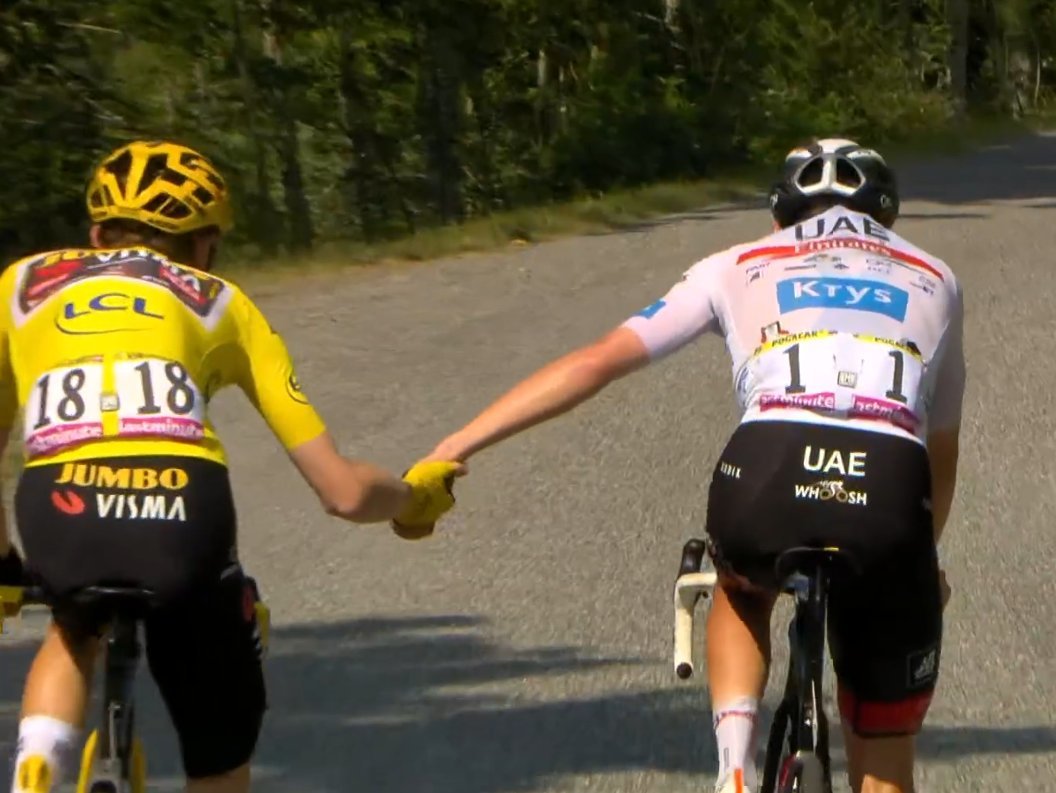The greatness of the winner is measured on the scales with the size of the defeated.
Because cycling is about winners, but, above all, about losers, about heroes without prizes, about immense dualities, about scheduled rematches.
"
Vingegaard
gives me the motivation to be better. The battle with him was very nice", says the dispossessed
Tadej Pogacar
, who could not emulate the three Tours followed by the chosen ones (just
Bobet, Anquetil, Merckx, Indurain and Froome
) and those affronts are gasoline for the future.
To know more
Tour de France.
Jonas Vingegaard, the climber who cleaned fish
Drafting: LUCAS SÁEZ-BRAVO (Special envoy) Paris
Jonas Vingegaard, the climber who cleaned fish
The 2022 Tour, full of its spectacle, left the inauguration of a rivalry, the promise that between Vingegaard and Pogacar, 25 and 23 years old, emulate one of the great duels in history.
Coppi-Bartali
The most iconic stamp of cycling and one of the indelible ones in the history of sport was starred by the two Italians in 1952, in the ascent of the Telegraphe.
An example of sportsmanship, Vingegaard's gesture with Pogacar on the descent from Spandelles, waiting for the Slovenian when he had gone to the ground, reminded us of the beautiful image in which Fausto Coppi and Gino Bartali exchange a can of water, without it ever having arrived to clarify completely who gave it to whom.
They shared a team and their rivalry was great, because they divided a country.
Half Italy with the young Coppi, the 'Campeonissimo', elegant, obsessed with physical preparation.
He was identified with the left and the most conservative criticized him until his divorce.
The other side chose old Bartali, a cyclist of strength and race, who smoked a cigar when he finished the races, devoted and chosen as a symbol by Mussolini.
Years after his death it became known of his heroic clandestine work saving Jews from the Nazis.
Coppi won five Giros and two Tours and Bartali three and two, although the war mutilated the winners of both.
Anquetil - Poulidor
Jacques Anquetil
was the first cyclist to win five Tours.
His dominance was so overwhelming, so mathematical and cold the way he resolved his victories, that he never quite conquered the French heart.
He was booed in the ditches and the main reason was because the one who had taken over the local preferences was the cyclist he always beat,
Raymond Poulidor
.
Pou Pou, for the history of the sport the great loser, eight times second or third in the Tour (he had the misfortune to coincide at the end of his career with the Merckx era), not one day in yellow -his grandson
Mathieu Van der Poel
managed settle that affront-, he was the cursed hero.
Legend has it that, on his deathbed, Anquetil joked with his great rival: "Even in that you're going to be second."
His ascent side by side to the Puy de Dome in 1964 is another of the great pages in the history of cycling.
Merckx - Ocaña
If anyone could look the greatest cyclist of all time in the eyes, it was
Luis Ocaña
.
"Merckx had many different rivals, part of his greatness is that he fought against all of them and none surpassed him. Orcières-Merlette was his biggest defeat in his best years. On the Tour, Ocaña was the rival he feared the most," he admitted to this newspaper
William Fotheringham
, the biographer of the Cannibal.
And he remembers the stage that could change everything, when three days after the Spaniard destroyed the Belgian like "Cordobés to the bulls", he fell dramatically going down Menté and had to leave that 1971 Tour in yellow.
That episode for which Merckx admitted that "I would prefer to have finished second than to have won this way", postponed the duel forever.
At the following Tour, bronchitis forced Ocaña to withdraw and in 1973 the Belgian decided to run the Vuelta (and win it) and the Giro, so the Spaniard took advantage of the opportunity and devoured the Grande Boucle: he won six stages and Thévenet, the second, it was 16 minutes away.
Lemond-Hinault
The Frenchman and the American also signed an epic duality, marked by their early years, where they shared a team in Bernard Tapie's La Vie Claire.
On the one hand, the farmer's son, the Breton Bernard Hinault, brave, brave, voracious, vehement, winner of five Tours and the heart of the French.
Opposite, the modernity that
Greg Lemond
represented , signed at the stroke of a checkbook.
And an unforgettable episode in the Alps.
It happened in 1986, when the Badger was facing the last opportunity to win his sixth Tour, although he would have promised LeMond that it would be for him, as a reward for the help given in the previous edition.
But everything had soon blown up, with attacks and betrayals, a conflict between the two that divided the team in two.
In the stage that ended in Alpe d'Huez they entered hand in hand, a false peace that no one trusted.
Hinault obsessed over a sixth win, forgetting that without me he never would have gotten a fifth.
He created an unbearable climate", confessed the Californian, who would also take the 1989 and 1990 editions, also with his high dose of rivalry with Laurent Fignon, whom he won a Tour by eight seconds.
Conforms to The Trust Project criteria
Know more
Italy
Articles Lucas Sáez-Bravo

